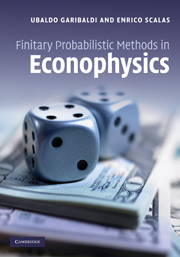Book contents
- Frontmatter
- Contents
- Foreword
- Acknowledgements
- 1 Introductory remarks
- 2 Individual and statistical descriptions
- 3 Probability and events
- 4 Finite random variables and stochastic processes
- 5 The Pólya process
- 6 Time evolution and finite Markov chains
- 7 The Ehrenfest–Brillouin model
- 8 Applications to stylized models in economics
- 9 Finitary characterization of the Ewens sampling formula
- 10 The Zipf–Simon–Yule process
- Appendix: Solutions to exercises
- Author index
- Subject index
- References
1 - Introductory remarks
Published online by Cambridge University Press: 05 July 2014
- Frontmatter
- Contents
- Foreword
- Acknowledgements
- 1 Introductory remarks
- 2 Individual and statistical descriptions
- 3 Probability and events
- 4 Finite random variables and stochastic processes
- 5 The Pólya process
- 6 Time evolution and finite Markov chains
- 7 The Ehrenfest–Brillouin model
- 8 Applications to stylized models in economics
- 9 Finitary characterization of the Ewens sampling formula
- 10 The Zipf–Simon–Yule process
- Appendix: Solutions to exercises
- Author index
- Subject index
- References
Summary
This chapter contains a short outline of the history of probability and a brief account of the debate on the meaning of probability. The two issues are interwoven. Note that the material covered here already informally uses concepts belonging to the common cultural background and that will be further discussed below. After reading and studying this chapter you should be able to:
• gain a first idea on some basic aspects of the history of probability;
• understand the main interpretations of probability (classical, frequentist, subjectivist);
• compute probabilities of events based on the fundamental counting principle and combinatorial formulae;
• relate the interpretations to the history of human thought (especially if you already know something about philosophy);
• discuss some of the early applications of probability to economics.
Early accounts and the birth of mathematical probability
We know that, in the seventeenth century, probability theory began with the analysis of games of chance (a.k.a. gambling). However, dice were already in use in ancient civilizations. Just to limit ourselves to the Mediterranean area, due to the somewhat Eurocentric culture of these authors, dice are found in archaeological sites in Egypt. According to Svetonius, a Roman historian, in the first century, Emperor Claudius wrote a book on gambling, but unfortunately nothing of it remains today.
It is ‘however’ true that chance has been a part of the life of our ancestors. Always, and this is true also today, individuals and societies have been faced with unpredictable events and it is not surprising that this unpredictability has been the subject of many discussions and speculations, especially when compared with better predictable events such as the astronomical ones.
- Type
- Chapter
- Information
- Finitary Probabilistic Methods in Econophysics , pp. 1 - 14Publisher: Cambridge University PressPrint publication year: 2010



